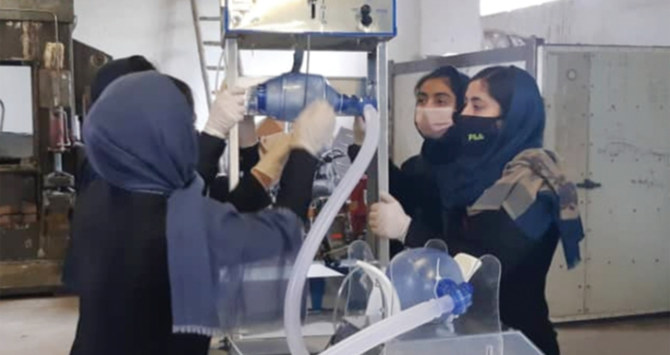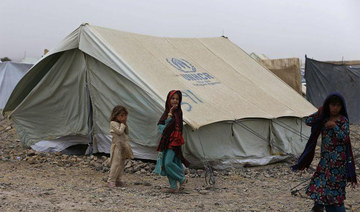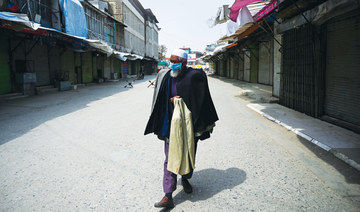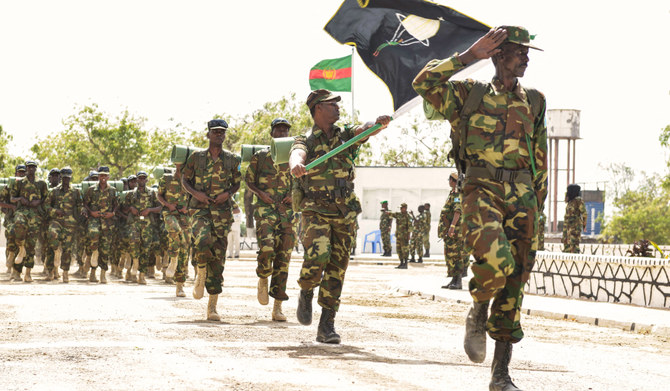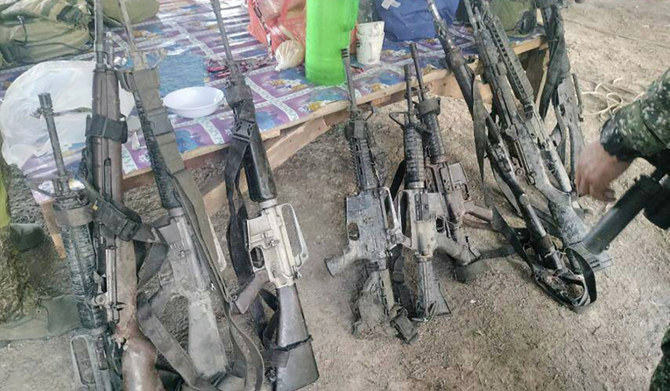KABUL: A team of Afghan female robotics experts has developed a lifesaving ventilator, made from Toyota car parts, to help with the treatment of coronavirus disease (COVID-19) patients.
The girls, who won a medal in a global competition for creating a robot that could distinguish between contaminated and clean water, were invited by the governor of the western Afghan city of Herat to try and build a version of the medical device due to a desperate shortage of ventilators in the province.
The impoverished region of war-torn Afghanistan has recently witnessed a sharp rise in the number of COVID-19 cases.
The team, aptly named the Afghan Dreamers, initially tried to source parts from abroad for an advanced digital machine, but high costs and flight suspensions caused by the pandemic made shipments to Afghanistan impossible.
Undaunted, the innovative group looked for supplies closer to home, and came up with the idea of using parts from Toyota Corolla cars sourced from local bazaars.
Based on copies of modern ventilators produced by the Massachusetts Institute of Technology (MIT) in the US, the team drew up its own product design and sent copies to MIT and Harvard University for approval.
“We had to be prepared for the worst situation because we do not have access to Amazon and other companies for online orders. So, it was best to use local devices we have in our country,” tech entrepreneur Roya Mahboob, who set up the team, told Arab News.
“We discussed our design with a professor from MIT, and sent it, based on the MIT prototype, using Toyota Corolla parts. He (the professor) was so surprised and wrote back to us saying that it was a clever design but would need to see if the system worked.
“What we are hoping, is that with the help of MIT we will be able to improve our model and make it ready for actual use by the end of May or June,” added Mahboob.
The prototype ventilator would have to be approved by the World Health Organization (WHO) and the Afghan Public Health Ministry before the team could start producing more machines, said Dr. Mehdi Hadid, a member of the consultative board fighting the spread of COVID-19 in Herat.
“The machine (ventilator) will be able to supply a certain volume of oxygen and adjust the rate of respiration,” he told Arab News.
With acute shortages of electricity in many parts of the country, the ventilator can operate not only on mains supply, but also by battery and solar power, he said.
Afghanistan has 300 digital ventilators and hopes to buy more for its fight against the virus which has so far infected 484 people and claimed 15 lives.
The Afghan Dreamers’ locally made ventilator will cost around $400 and would mostly be used for emergency cases in remote areas where there were few clinics, said Farzana Nekpour, the team’s head of public relations.
“The current challenge for us is the risk of contracting the coronavirus by being in the workshop under one roof working on the design. We work very close together and there is no social distancing, so there is the chance of contamination despite us wearing masks and gloves,” she told Arab News.
Mahboob said that one of the main future challenges would be finding enough Toyota parts to produce more devices, as many shops and outlets were closing due to lockdowns imposed throughout Afghanistan. “But we have to find a means to help people and make this a successful project for our poor nation. It is vital.”
Entrepreneur Mahboob became one of Afghanistan’s first female chief executives at the age of 23. She set up a nonprofit organization to help young women to build digital literacy and has since been named one of Time Magazine’s 100 most influential people.
In 2017, the members of her all-female robotics team made international headlines when their US visas were rejected not long before they were due to travel to an international robotics competition in Washington, DC. After individual appeals to the US Embassy in Kabul failed, the group took to social media to air their grievances. The team’s plight received international attention and led to US President Donald Trump intervening on their behalf.
The team returned from the competition with a silver medal for “courageous achievement” won by their ball-sorting robot, designed to distinguish between contaminated and clean water.
Since returning home, the team has become an inspiration for women seeking higher education in male-dominated Afghanistan, where about 40 percent of women are literate.
Its other achievements include the development of a device to help farmers pick saffron, one of the country’s main industries, and the building of drones and robots for use in the mining sector.



